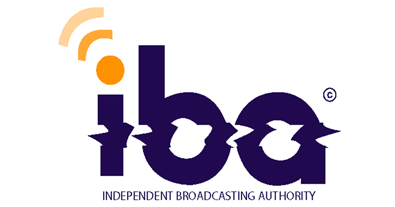LICENSING
Background
In order to ensure compliance to the provisions of the IBA Act(2002), IBA Amendment Act(2010) and other broadcast regulations, the IBA through its Inspectorate, undertakes inspection of broadcast infrastructure and monitors content.
Enforcing Compliance
The Authority uses several measures to ensure licensees are compliant. These include:
Inspection
Inspections encompass a wide range of issues including studio set up, equipment, acoustics, personnel, record keeping, sanitation, safety, and documents, among others.
Monitoring
Monitoring involves listening to radio and watching television in real-time in order to ensure broadcasts are in conformity with the IBA Act and other broadcast regulations.
Section 38 of the IBA Act of 2002 provides; ?A broadcasting Licensee shall keep and store sound and video recordings of all programmes broadcast or re-broadcast for a minimum period of three months after the date of transmission or for such further period as may be directed by the Board, and produce such material that has been broadcast for examination.?
In this regard, the Authority also conducts post monitoring reviews of media content.
Issues of Concern
When monitoring and reviewing media content, the Authority pays particular attention to a wide range of issues such as:
Programme moderation
Competence of the moderator as reflected in programme control, research on the topic, guidance given to guests and callers, and adherence to ethics are monitored.
For more information, please refer to the Standard Operating Procedures for Broadcasting document .
News items
News items are expected to adhere ethical standards reflecting such elements as balance, fairness, accuracy and truth among others.
Musical programmes
The Authority monitors all radio and television content including music. Comments and language of presenters, announcers and DJs are monitored. Further, language and messages in songs are monitored to ensure conformity with the general cultural set-up of Zambia.
Signal quality
Spectrum is a scarce resource and as such, the IBA ensures that those given the privilege to use the frequencies maximise the use by covering the given area. Therefore, the Authority monitor coverage of radio licensees to ensure people are getting the signal in all parts a station is licensed to cover.
Programme schedule
Radio and Television stations are expected to follow their programme schedules and notify the public in advance if and when they are not able to bring a scheduled programme. Where a licensee decides to change the programming permanently, the licensee is expected to notify the Authority before effecting the change.
Public concerns related to the media
The IBA is a public institution and therefore all its work is directed at ensuring that the public gets the maximum benefits from the broadcasting sector. In this regard, IBA takes note of all public concerns related to the broadcasting industry made on radio, through complaints to the Authority and through any other means. This helps to enforce decision making by the Authority.
For more information, please refer to the Standard Operating Procedures for Broadcasting document .
Punitive Measures
Guidance
This is where a licensee is given steps to take in order to make good of the breach committed.
Guidance is also given to licensees on several issues aimed at improving their performance and well-being as well as the broadcast industry in general.
Hearing
This is when a licensee is summoned to appear before a Committee of the Board to account for the breach committed. The Board will then make a decision based on the outcome of the Hearing.
Suspension
This is when the Authority withdraws a broadcast licence from an erring licensee for a period of time in order to force them to make good the breach committed. After the period expires, the Board will make a decision on the next course of action.
Cancellation of a Licence
This means withdrawing the licence and the licensee stops providing broadcasting services in Zambia for good.

